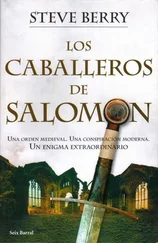Steve Berry - The Templar legacy
Здесь есть возможность читать онлайн «Steve Berry - The Templar legacy» весь текст электронной книги совершенно бесплатно (целиком полную версию без сокращений). В некоторых случаях можно слушать аудио, скачать через торрент в формате fb2 и присутствует краткое содержание. Жанр: Триллер, на английском языке. Описание произведения, (предисловие) а так же отзывы посетителей доступны на портале библиотеки ЛибКат.
- Название:The Templar legacy
- Автор:
- Жанр:
- Год:неизвестен
- ISBN:нет данных
- Рейтинг книги:5 / 5. Голосов: 1
-
Избранное:Добавить в избранное
- Отзывы:
-
Ваша оценка:
- 100
- 1
- 2
- 3
- 4
- 5
The Templar legacy: краткое содержание, описание и аннотация
Предлагаем к чтению аннотацию, описание, краткое содержание или предисловие (зависит от того, что написал сам автор книги «The Templar legacy»). Если вы не нашли необходимую информацию о книге — напишите в комментариях, мы постараемся отыскать её.
The Templar legacy — читать онлайн бесплатно полную книгу (весь текст) целиком
Ниже представлен текст книги, разбитый по страницам. Система сохранения места последней прочитанной страницы, позволяет с удобством читать онлайн бесплатно книгу «The Templar legacy», без необходимости каждый раз заново искать на чём Вы остановились. Поставьте закладку, и сможете в любой момент перейти на страницу, на которой закончили чтение.
Интервал:
Закладка:
In the light from the oil lamp he calculated that the iron door was just over a yard long and half a yard wide. It lay flush to the floor with no lock. Thankfully its frame was stone, but he worried about the hinges, which was why he'd brought a container of lamp oil. Not the best lubricant, but it was all he could find on short notice.
He doused the hinges with oil and hoped time's grip would loosen. He then wedged the tip of an iron bar beneath one edge of the door and pried upward.
No movement.
He pried harder.
The hinges started to give.
He wiggled the bar, working the rusted metal, then applied more oil. After several efforts the hinges screamed and the door pivoted open and froze in place, pointing toward the ceiling.
He shone the lantern into the dank opening.
Narrow steps led down five yards to a rough stone floor.
A surge of excitement swept through him. He'd heard tales from other priests about things they'd found. Most of it stemmed from the Revolution when churchmen hid relics, icons, and decorations from republican looters. Many of the Languedoc's churches fell victim. But the one in Rennes-le-Chateau had been in such a state of decay, there was simply nothing to loot.
Perhaps they'd all been wrong.
He tested the top step and determined that they'd been hewn from the church's rock foundation. Lamp in hand, he crept down, staring ahead into a rectangular space, it, too, chipped from rock. An archway divided the room in half. Then he saw the bones. The outer walls were pocked with oven-like cavities, each one containing a skeletal occupant, along with the remnants of clothing, shoes, swords, and burial shrouds.
He shone the light near a few of the tombs and saw that each was identified with a chiseled name. All were d'Hautpouls. Dates ranged from the sixteenth to the eighteenth centuries. He counted. Twenty-three filled the crypt. He knew who they were. The lords of Rennes.
Beyond the center arch, a trunk lying beside an iron pot caught his eye.
He stepped over, lamp in hand, and was startled when something glistened back. He thought at first his eyes were deceiving him, but quickly realized the vision was real.
He bent down.
The iron kettle was filled with coins. He lifted one out and saw that they were French gold pieces, many bearing a date: 1768. He knew little of their value but reasoned that it was considerable. Hard to tell how many filled the cauldron, but when he tested its weight he was unable to move the container one millimeter.
He reached for the trunk and saw that its hasp was not locked. He pushed open the lid and saw that the inside was filled, on one side, with leather-bound journals and, on the other, with something wrapped in an oilskin cloth. Carefully, he poked with his finger and determined that whatever lay inside was many, small, and hard. He laid down the lamp and peeled back the top fold.
The light again caught a sparkle.
Diamond.
He laid back the rest of the oilskin and the breath left him. Lying within the trunk was a cache of jewelry.
Without question, republican looters of a hundred years ago made a mistake when they bypassed the ramshackle church at Rennes-le-Chateau. Or maybe the person or persons who selected this as their hiding spot simply chose wisely.
"The crypt existed," Claridon said. "In the notebook you have there, I just read that Lars found a parish register for the years 1694 to 1726 that speaks of the crypt, but the register does not mention its entrance. Sauniere noted in his personal diary that he discovered a tomb. He then wrote in another entry, The year 1891 carries to the highest the fruit of that of which one speaks. Lars always thought that entry important."
Malone eased the car to the side of the road and turned back to face Claridon. "So that gold and those jewels were Sauniere's source of income. That's what he used to finance the church remodeling?"
Claridon laughed. "At first. But, monsieur, there is even more to the story."
Sauniere stood.
Never had he seen so much wealth in one place. What fortune had come his way. But he needed to salvage it without arousing suspicions. To do that, he would need time. And no one could be allowed to discover the crypt.
He bent down, retrieved the lamp, and decided that he might as well start tonight. He could remove the gold and jewels, hiding both in the presbytery. How to convert them to useful currency could be decided later. He retreated toward the staircase, taking another look around as he walked.
One of the tombs caught his attention.
He approached and saw that the niche contained a woman. Her burial dress lay flat, only bones and a skull remained. He held the lamp close and read the inscription beneath:
MARIE D'HAUTPOUL DE BLANCHEFORT
He was familiar with the countess. She was the last of the d'Hautpoul heirs. When she died in 1781, control of both the village and surrounding lands slipped away from her family. The Revolution, which came only a dozen years later, forever eliminated all aristocratic ownership.
But there was a problem.
He quickly climbed back to ground level. Outside, he locked the church doors and, through a blinding rain, hustled around the building to the parish close and worked his way through the graves where the tombstones seemed to swim in the living blackness.
He stopped at the one he sought and bent down.
Shining the lamp, he read the inscription.
"Marie d'Hautpoul de Blanchefort was buried outside, too," Claridon said.
"Two graves for the same woman?" Stephanie asked.
"Apparently. But the body was in the crypt."
Malone remembered what Stephanie had said yesterday about Sauniere and his mistress molesting the graves in the churchyard, then chiseling away the inscription on the countess's headstone. "So Sauniere dug up the grave in the churchyard."
"That's what Lars believed."
"And it was empty?"
"Again, we'll never know, but Lars felt that to be the case. And history would seem to support his conclusion. A woman of the countess's stature would never have been buried. She would have been laid in a crypt, which is indeed where the body was found. The grave outside was something altogether different."
"The tombstone was a message," Stephanie said. "We know that. That's why Eugene Stublein's book is so critical."
"But unless you know the story of the crypt, the grave in the cemetery would generate no interest. Just another memorial, along with all the others. The abbe Bigou was smart. He hid his message in plain sight."
"And Sauniere discovered it?" Malone asked.
"Lars believed so."
Malone turned back to the wheel and motored the car onto the road. They headed down the last stretch of highway, then turned west and crossed the swift-moving Rhone. Ahead rose Avignon's fortified walls, the papal palace looming high above. Malone turned off the busy boulevard into the old city, passing the market square containing the book fair they'd visited earlier. He wound a path back toward the palace and parked in the same underground garage.
"I have a stupid question," Malone said. "Why doesn't somebody just dig beneath the church at Rennes, or use ground radar to verify the crypt?"
"The local authorities will not allow it. Think about that, monsieur. If nothing were there, what would happen to the mystique? Rennes lives off Sauniere's legend. The whole Languedoc benefits. The last thing anyone wants is proof of anything. They profit far too well from myth."
Malone reached under the seat and retrieved the gun he'd taken from his pursuer last night. He checked the magazine. Three rounds left.
"Is that needed?" Claridon asked.
"I feel a whole better with it." He opened his door and stepped out, stuffing the gun beneath his jacket.
Читать дальшеИнтервал:
Закладка:
Похожие книги на «The Templar legacy»
Представляем Вашему вниманию похожие книги на «The Templar legacy» списком для выбора. Мы отобрали схожую по названию и смыслу литературу в надежде предоставить читателям больше вариантов отыскать новые, интересные, ещё непрочитанные произведения.
Обсуждение, отзывы о книге «The Templar legacy» и просто собственные мнения читателей. Оставьте ваши комментарии, напишите, что Вы думаете о произведении, его смысле или главных героях. Укажите что конкретно понравилось, а что нет, и почему Вы так считаете.











